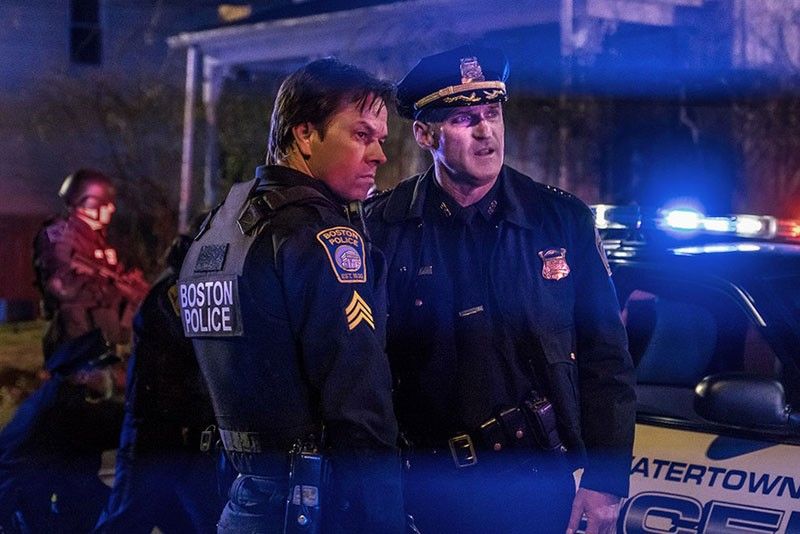Boston Strong

Watching Patriots Day, Peter Berg’s account of the Boston Marathon Bombing of April 2013 and its subsequent investigation, you kind of miss the image of America as united behind a single cause. Of course, that “cause” was bringing to justice a pair of self-described Chechen youths who plotted maximum destruction during the city’s most popular public event.
Nowadays, with so much divisive American rhetoric, it’s unclear whether Patriots Day — which played here the last few weeks — speaks louder to Trump supporters who want to ban immigration or diversity-conscious Americans who might see in its story a tale of interwoven Bostonians, eager to work together to resist acts of hatred.
Bostonians themselves have been a bit critical of Berg’s film, even with local son Mark Wahlberg cast as Boston Police Department Sergeant Tommy Saunders (a composite character, though Wahlberg’s accent — dropped “r”s and all — is accurate enough). They gripe that details are not 100 percent right, and that the everyday people who crowd-sourced cellphone photos to help the FBI and police nail the bombers don’t get their proper due.
Maybe. But it’s a gripping enough recounting of the events.
Self-radicalized brothers Dzhokhar and Tamerlan Tsarnaev (Alex Wolff and Themo Melikidze) plot to explode two pressure-cooker bombs at the finish line of the Boston Marathon, getting their instructions from an Al Qaeda website called Inspire. It’s fittingly ironic that electronic devices play such a key role in these millennials’ nefarious activities, because it’s the same hi-tech devices — GPS tracking, surveillance cameras, cellphone photos supplied by the Boston Marathon crowd — that eventually help nail down physical descriptions of the two perps.
In the interest of storytelling, Wahlberg’s sergeant is there every step of the way, from crowd control at the marathon finish line, to helping the FBI locate all available security cameras in the vicinity. He’s also out on patrol in both Cambridge and Watertown where the brothers are, respectively, encountered and captured, so he does seem to get around a lot for a fictional character.
That’s one fictional touch that grates on Bostonians’ nerves. After all, it was the combined efforts of Boston police and its fire department, as well as helpful tips sent in by thousands of locals, that helped pin down the suspects. Why not simply focus on the actual cops that Wahlberg stands in for? It turns out these cops wouldn’t consent to having their stories told in the movie. So Wahlberg is called upon to do the heavy (fictional) lifting.
But the real task of the movie is to narrow our attention to a pinpoint of hatred towards the perpetrators, which is not difficult to do considering that, after bombing a public place and calmly strolling away, they killed an MIT campus policeman point-blank, then abducted a young Chinese-American, stealing his SUV to transport a trunkload of explosives (all the while criticizing his lack of an iPod dock and his “funny” accent).
All the ethnically diverse side characters are important to show the diversity of Boston, though the city itself is not widely known for its racial harmony. It’s made up of enclaves of Irish-Catholics, Italians, Hispanic, African-Americans, Vietnamese, Chinese, and every other group you can imagine, but they don’t exactly join hand-in-hand during brotherhood parades.
Still, on that crazy weekend, they did. Or at least most people were willing to put aside their issues and comply with police directives to stay off the streets (martial law, in effect) and even the closing of all train and bus lines in and out of Boston.
I remember this well because I was supposed to visit Boston that week with my family, taking a train in from New York. No go. When I saw the escape routes had been closed down, I knew those brothers were never gonna walk away free; Bostonians have a habit of rendering street justice, with fists and pipes. We watched the news as the second brother was captured in a Watertown resident’s backyard, hiding inside a boat. He was shot and badly beaten by cops, but still alive when taken into custody.
The catchphrase to emerge after the incident was “Boston Strong,” and Patriots Day captures that sentiment well. Bostonians may be gruff, and tough, and lack any patience for B.S., but they will do anything to protect themselves, and one another. Towards the end, Wahlberg’s Sergeant Saunders ruminates over whether such acts of terrorism are preventable in America. He gives a (possibly unnecessary) speech about the “only thing hate can’t touch is love. Love fights back.” This sentiment is certainly echoed in the closing credits by the actual accounts of victims of the Boston bombing, which claimed three lives (including a young boy) and required dozens of people to have limbs amputated. The survivors speak of strangers coming up to them, seconds after the blast, offering help and assistance. It is true that people come together in a genuine crisis, and will summon up more power than the hateful can imagine is even possible.
But it wasn’t exactly love coursing through Boston during that week after the bombings. Quite the opposite. And that’s, ultimately, what helped bring the suspects down. Because love does fight back.















